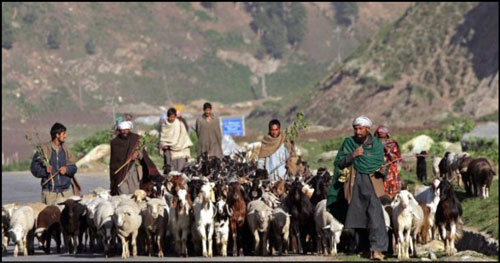On Monday, September 13, when Manoj Sinha, the lieutenant governor of Jammu and Kashmir, handed over certificates of individual and community rights to the people of the Gujjar-Bakerwal and Gaddi-Sippi Scheduled Tribes as part of a ceremony to implement the Scheduled Tribes and Other Forest Dwellers (Recognition of Forest Rights) Act in J&K, local people with keen memories found several ironies in the situation.
That was because, while the Bharatiya Janata Party (BJP) has been projecting itself as the saviour of tribal communities in J&K since the BJP-led Union government unilaterally read down Article 370 on August 5, 2019, and changed the state’s status to that of a union territory, the party appears to have forgotten that it had vehemently opposed key proposals that had aimed to safeguard and empower the very same communities when it was in power in the state between 2015 and 2018 in alliance with the People’s Democratic Party (PDP).
In fact, the BJP members of the state government had even used the then state’s special status conferred by Article 370 of the Constitution of India to oppose some of these proposals.
The BJP’s opposition in 2017 and 2018 to proposals ranging from the tribal policy to enacting the then state’s own Forest Rights Act (FRA) scuttled key initiatives mooted by the tribal affairs ministry to safeguard the rights of Gujjars and Bakerwals.
These predominantly Muslim tribal communities have historically faced injustices in J&K since the time of Partition, including attacks, evictions and displacements.
According to the 2011 census, 86.3% of the Scheduled Tribes in J&K (which at that time also included Ladakh) are Muslims.
The creation of a Ministry of Tribal Affairs had been part of the Agenda of Alliance, the common minimum programme worked out by the PDP and the BJP to share power in the state when the two parties allied in 2015, after the 2014 elections.
But although the BJP had agreed to the creation of the ministry, which was formed in 2015, it opposed the tribal policy when it was placed before the cabinet in December 2017 for approval.
The tribal policy had proposed a multi-pronged approach for the all-round development of tribal communities in Jammu & Kashmir without affecting their culture and identity.
According to news reports at the time, the BJP ministers had opposed the policy by claiming it would wreak havoc on the forests in the state.
They had also opposed a provision in the policy that sought the regularisation of tribal community settlements on state-owned land.
“The coalition partner did not agree to the proposal,” Choudhary Zulfikar Ali, the then tribal affairs minister, told The Wire.
The stalemate between the two ruling parties on the issue eventually led to the formation of a cabinet sub-committee headed by Nirmal Singh, the BJP leader and then deputy chief minister, to iron out differences in opinion and come to an agreement.
But despite several reminders in writing from the tribal affairs ministry, no meeting of this sub-committee was ever held, said Zulfikar, who had been a minister from the PDP quota in the coalition government.
The Forest Rights Act A year before the Union government read down Article 370 on August 5, 2019, the BJP had openly voiced its opposition to the enactment of a Forest Rights Act in the state or an extension of the Centre’s FRA to J&K.
Ironically, in opposing the extension of the Union’s FRA to J&K, the BJP had invoked J&K’s special status, which it had been opposing since the days of the Jan Sangh which had preceded the formation of the BJP. J&K’s special status was done away with a year later when Article 370 was read down.
“Special status has saved our forests; otherwise they would have been finished long ago. If something good is coming from the country, we have the right to implement it in the state.
But something that doesn’t suit us can ruin this state,” Lal Singh, who was then associated with BJP and had been the state’s forest minister, had told a news channel in February 2018.—GS










